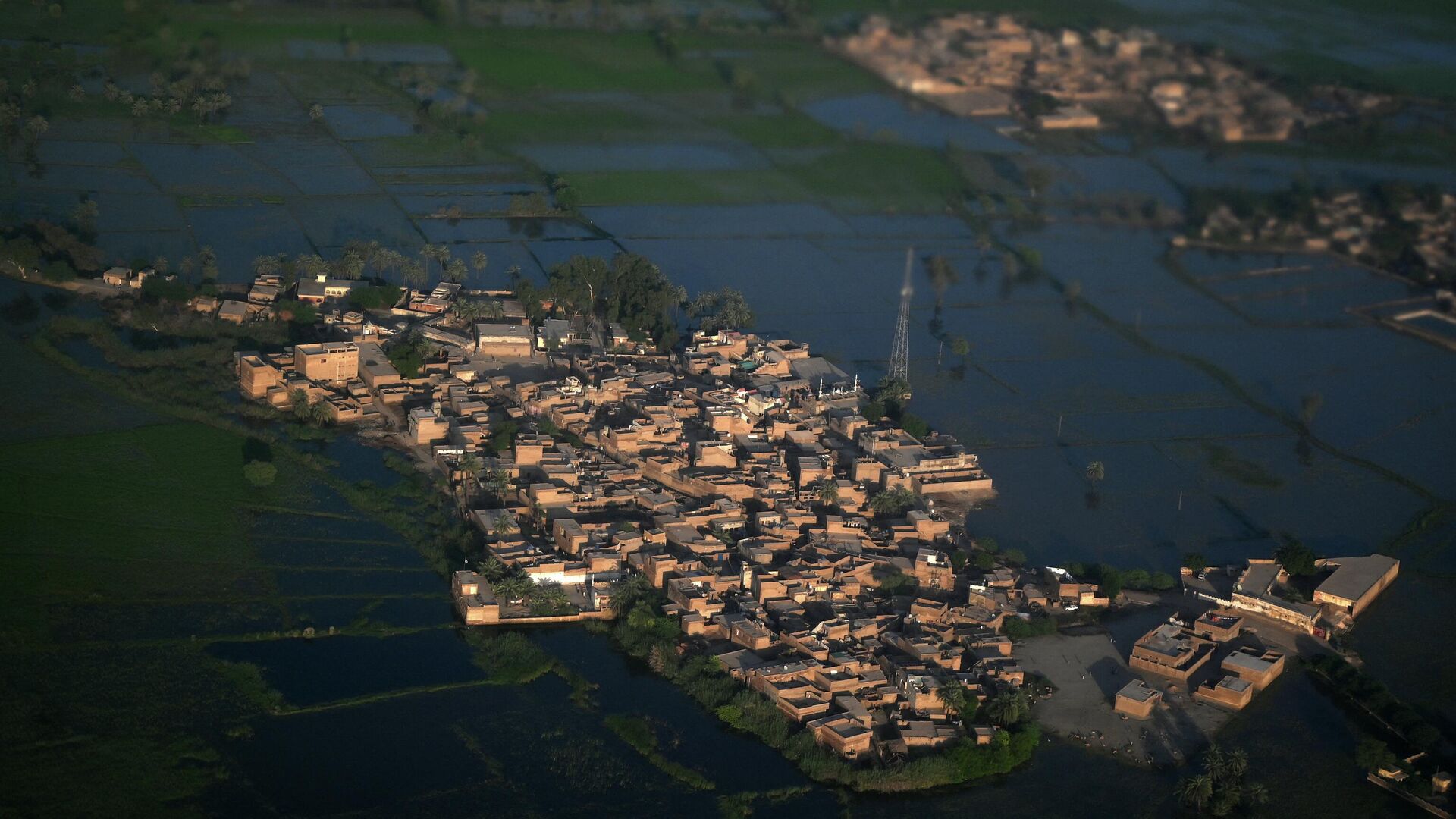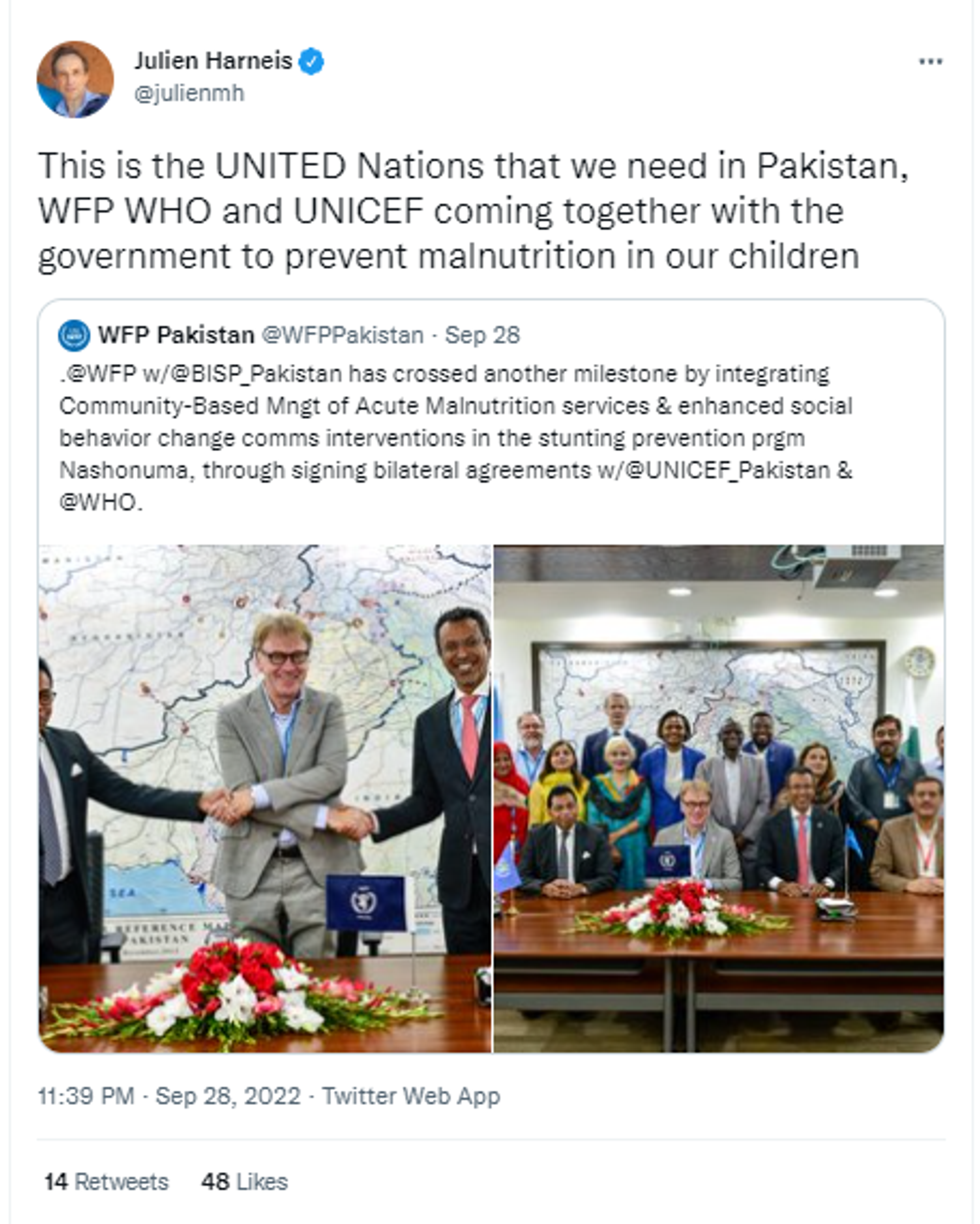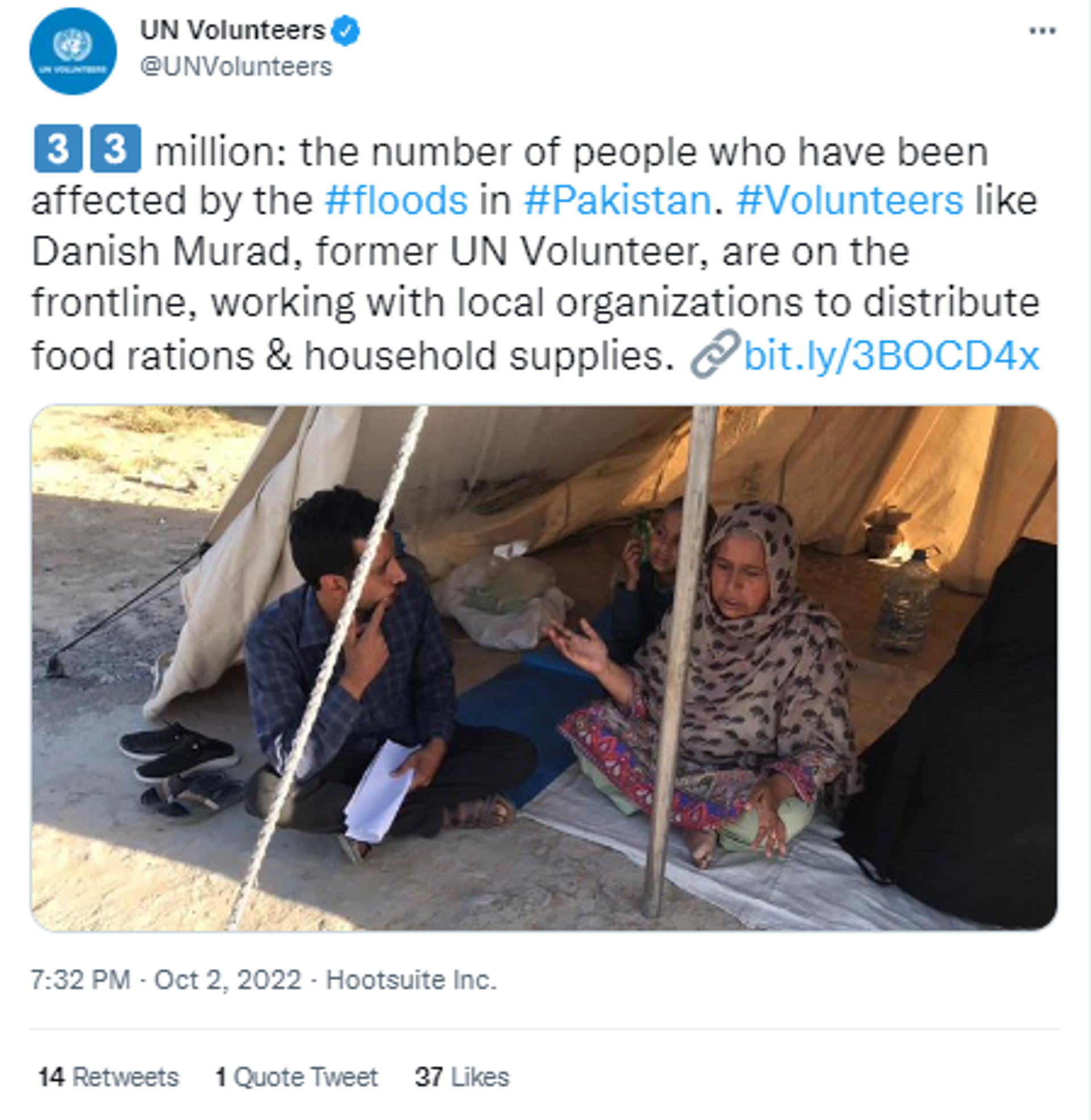https://sputnikglobe.com/20221004/un-raises-red-flag-over-threat-of-food-crisis-for-57-million-pakistani-flood-survivors-1101472721.html
UN Raises Red Flag Over Threat of Food Crisis For 5.7 Million Pakistani Flood Survivors
UN Raises Red Flag Over Threat of Food Crisis For 5.7 Million Pakistani Flood Survivors
Sputnik International
In August-September this year, incessant rains in Pakistan triggered unprecedented floods, covering one third of the country in water and claiming over 1,695... 04.10.2022, Sputnik International
2022-10-04T15:17+0000
2022-10-04T15:17+0000
2023-02-14T08:48+0000
world
pakistan
disaster
disaster
disaster relief
natural disaster
harvey flood
floods
https://cdn1.img.sputnikglobe.com/img/07e6/09/0a/1100641916_0:160:3073:1888_1920x0_80_0_0_23b4f79035fb7236034882f6635f3b51.jpg
The United Nations (UN) humanitarian agency has issued a report claiming that the current floods in Pakistan are expected to exacerbate food insecurity in the country, leading 5.7 million Pakistani flood survivors to face a serious food crisis in the next three months.Julien Harneis, the UN’s humanitarian coordinator for the country, informed that the UN, the World Food Programme (WFP), World Health Organization (WHO) and United Nations International Children's Emergency Fund (UNICEF) have joined hands with the government to combat the humanitarian crisis in the country. The agencies have scaled up their flood response and delivered aid to 1.6 million people directly affected by the floods.The agencies have scaled up their flood response and delivered aid to 1.6 million people directly affected by the floods.On Monday, the UN tweeted that the agency and its partners have also increased their humanitarian appeal for Pakistan from $160 million to $816 million.The country has witnessed the worst floods in decades and the UN Office for the Coordination of Humanitarian Affairs (OCHA) has said that this has caused a surge in water-borne and other diseases in Sindh and southwestern Baluchistan provinces, where floods have caused the most damage since mid-June.According to the reports, floodwater levels in 18 out of Sindh’s 22 districts had receded at least 34 per cent, and in some districts by up to 78 per cent.Even before the floods, 16 percent of the population was reportedly living in moderate or severe food insecurity, according to the World Health Organization (WHO).However, Pakistan's government insists that there is no immediate worry about food supplies, claiming that wheat stocks are enough to last through the next harvest and that the government is importing more.Several countries and UN agencies have sent more than 131 flights carrying aid for survivors, but many have complained that they have either received too little help or are still waiting for it to arrive.While several flood survivors continue to live in “unsanitary conditions in temporary shelters, often with limited access to basic services", pregnant women are being treated in temporary camps. An estimated 130,000 pregnant women are reported to need urgent health services. “Already before the floods, Pakistan had one of the highest maternal mortality rates in Asia, with the situation likely to deteriorate,” the report said.Pakistan's government has said that the floods created havoc in the country, causing about $30 billion of damage to its economy. While Pakistan Railways has started to restore train services from Sindh to other cities, several thousands of kilometers of roads have been reportedly washed away, leaving over 440 bridges destroyed.
pakistan
Sputnik International
feedback@sputniknews.com
+74956456601
MIA „Rossiya Segodnya“
2022
Sangeeta Yadav
https://cdn1.img.sputnikglobe.com/img/07e4/08/1b/1080292803_0:121:960:1081_100x100_80_0_0_7490b319dab9611e309056b177265184.jpg
Sangeeta Yadav
https://cdn1.img.sputnikglobe.com/img/07e4/08/1b/1080292803_0:121:960:1081_100x100_80_0_0_7490b319dab9611e309056b177265184.jpg
News
en_EN
Sputnik International
feedback@sputniknews.com
+74956456601
MIA „Rossiya Segodnya“
Sputnik International
feedback@sputniknews.com
+74956456601
MIA „Rossiya Segodnya“
Sangeeta Yadav
https://cdn1.img.sputnikglobe.com/img/07e4/08/1b/1080292803_0:121:960:1081_100x100_80_0_0_7490b319dab9611e309056b177265184.jpg
pakistan, disaster, disaster, disaster relief, natural disaster, harvey flood, floods
pakistan, disaster, disaster, disaster relief, natural disaster, harvey flood, floods
UN Raises Red Flag Over Threat of Food Crisis For 5.7 Million Pakistani Flood Survivors
15:17 GMT 04.10.2022 (Updated: 08:48 GMT 14.02.2023) In August-September this year, incessant rains in Pakistan triggered unprecedented floods, covering one third of the country in water and claiming over 1,695 lives. The floods also displaced more than 33 million people who now live in tents or makeshift homes. Pakistan's government estimates economic losses close to $30 billion.
The United Nations (UN) humanitarian agency has issued a report claiming that the c
urrent floods in Pakistan are expected to exacerbate food insecurity in the country, leading 5.7 million Pakistani flood survivors to face a serious food crisis in the next three months.
Julien Harneis, the UN’s humanitarian coordinator for the country, informed that the UN, the World Food Programme (WFP), World Health Organization (WHO) and United Nations International Children's Emergency Fund (UNICEF) have joined hands with the government to combat the humanitarian crisis in the country. The agencies have scaled up their flood response and delivered aid to 1.6 million people directly affected by the floods.
The agencies have scaled up their flood response and delivered aid to 1.6 million people directly affected by the floods.
On Monday, the UN tweeted that the agency and its partners have also increased their humanitarian appeal for Pakistan from $160 million to $816 million.
The country has witnessed the worst floods in decades and the UN Office for the Coordination of Humanitarian Affairs (OCHA) has said that this has caused a surge in water-borne and other diseases in Sindh and southwestern Baluchistan provinces, where floods have caused the most damage since mid-June.
According to the reports, floodwater levels in 18 out of Sindh’s 22 districts had receded at least 34 per cent, and in some districts by up to 78 per cent.
Even before the floods, 16 percent of the population was reportedly living in moderate or severe food insecurity, according to the World Health Organization (WHO).
However,
Pakistan's government insists that there is no immediate worry about food supplies, claiming that wheat stocks are enough to last through the next harvest and that the government is importing more.
Several countries and UN agencies have sent more than 131 flights carrying aid for survivors, but many have complained that they have either received too little help or are still waiting for it to arrive.
While several flood survivors continue to live in “unsanitary conditions in temporary shelters, often with limited access to basic services", pregnant women are being treated in temporary camps.
An estimated 130,000 pregnant women are reported to need urgent health services. “Already before the floods, Pakistan had one of the highest maternal mortality rates in Asia, with the situation likely to deteriorate,” the report said.
Pakistan's government has said that the floods created havoc in the country, causing about $30 billion of damage to its economy. While Pakistan Railways has started to restore train services from Sindh to other cities, several thousands of kilometers of roads have been reportedly washed away, leaving over 440 bridges destroyed.





